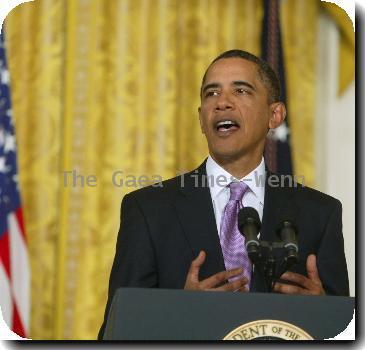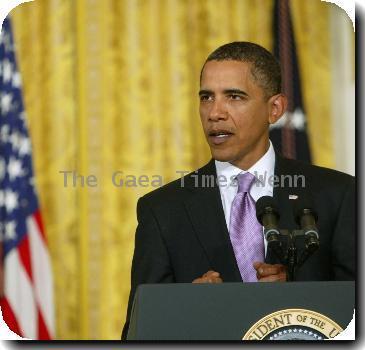Biden condemns new Israeli settlement plan, warns it ‘undermines’ climate for peace talks
By Aron Heller, APTuesday, March 9, 2010
Biden condemns new Israeli settlement plan
JERUSALEM — Vice President Joe Biden condemned an Israeli plan to build hundreds of homes in disputed east Jerusalem on Tuesday — a disagreement that tarnished a high-profile visit that had been aimed at repairing ties with the Jewish state and kickstarting Mideast peace talks.
Israel’s Interior Ministry said late Tuesday that it had approved construction of 1,600 new apartments, an embarrassing setback for Biden after a day of warm meetings with top Israeli officials.
Although ministry officials said the announcement was procedural and unconnected to the visit, a top aide to Prime Minister Benjamin Netanyahu said he was blindsided and tried to contain the damage at a late-night dinner with Biden.
Nonetheless, Biden issued a harshly worded statement after the dinner, saying its timing was especially troubling by coming on the eve of a new round of U.S.-mediated peace talks.
“The substance and timing of the announcement, particularly with the launching of proximity talks, is precisely the kind of step that undermines the trust we need right now,” Biden said.
“We must build an atmosphere to support negotiations, not complicate them,” he added, warning that “unilateral action taken by either party cannot prejudge the outcome of negotiations.”
Relations between Israel and the Obama administration have been chilly precisely because of the settlement issue, and one of Biden’s main goals had been to try to patch up ties. Biden is the highest-level member of the Obama administration to visit Israel.
The U.S., like the Palestinians and the rest of the international community, believes that Israeli settlements built on lands claimed by the Palestinians, including east Jerusalem, undermine peace prospects. President Barack Obama has been more outspoken on the issue than his predecessors.
U.N. Secretary-General Ban Ki-moon condemned the plans in a statement, saying they undermine “any movement towards a viable peace process.”
Netanyahu has rebuffed calls from the White House to halt all settlement activity, agreeing only to a limited freeze that does not include east Jerusalem.
Israel captured both areas in the 1967 Mideast war and subsequently annexed east Jerusalem. Israel considers its east Jerusalem neighborhoods to be part of its undivided capital, but the annexation has never been internationally recognized and the neighborhoods are widely seen as settlements.
Interior Ministry spokeswoman Efrat Orbach said the new homes would be built in Ramat Shlomo, an existing neighborhood for ultra-Orthodox Jews. She noted that there is a 60-day appeals period, indicating that the decision could yet be changed.
At Tuesday’s dinner, Netanyahu told Biden he was caught off guard by the ministry’s announcement, a top Israeli official said, speaking on condition of anonymity because the dinner was closed.
While Netanyahu considers east Jerusalem to be part of Israel, he acknowledged the timing of the announcement was poor and said he had no intention of sabotaging Biden’s visit. He stressed that there are no plans to begin construction anytime soon.
But Palestinian negotiator Saeb Erekat said the move soured the negotiating climate. The two sides agreed this week to begin indirect negotiations under the mediation of U.S. envoy George Mitchell. Peace efforts have been stalled for 14 months, in large part because of Palestinian anger over settlement activity.
“With such an announcement, how can you build trust? This is destroying our efforts to work with Mr. Mitchell,” Erekat said. “It’s a really disastrous situation. I hope that this will be an eye-opener for all in the international community.”
Interior Minister Eli Yishai’s office issued a statement saying Tuesday’s decision was a procedural step in a project that has been in the works for three years. “The timing … has no connection to the U.S. vice president’s visit to Israel,” it said.
Biden was scheduled to remain in the area for two more days, meeting with international Mideast envoy Tony Blair and Palestinian leaders in the West Bank on Wednesday before delivering a policy speech at Tel Aviv University on Thursday.
Biden had spent the day trying to calm Israeli concerns that Obama has been less friendly to the country than past U.S. leaders.
Earlier in the day, Biden assured Israelis they can count on strong U.S. backing as peace efforts finally resume. The resumption of talks, albeit indirect, is the first concrete achievement for Obama in the Israeli-Palestinian arena.
The relationship between the two allies, Biden told reporters as he stood beside Netanyahu, has always been a “centerpiece of American policy.”
“Progress occurs in the Middle East when everyone knows there is simply no space between the United States and Israel,” Biden said.
“The United States will always stand with those who take risks for peace,” Biden said, telling Netanyahu, “you’re prepared to do that.”
Obama began his term with a push for Mideast peace, prodding Israel to freeze its construction of West Bank settlements that swallow up land the Palestinians want for a future state.
The insistence on a total settlement freeze is seen by many in the region to have backfired. Polls show that Israelis have largely come to see Obama as overly sympathetic to Israel’s enemies, making it difficult for the administration to get Israeli public opinion behind any difficult peace moves.
Biden offered assurances that the U.S. remained committed to Israel’s security. Iran appeared to loom large in Biden’s discussions with Netanyahu. “We are determined to prevent Iran from acquiring nuclear weapons,” he said.
Israel has been pushing for stricter international sanctions targeting Iran’s nuclear program, and has refused to rule out a military strike if sanctions fail.
A string of top U.S. officials in recent weeks have urged Israel to give more time for diplomatic pressure on Iran to work.
Tags: Barack Obama, International Agreements, Iran, Israel, Jerusalem, Joe biden, Middle East, North America, Palestinian Territories, Territorial Disputes, United States, West Bank







